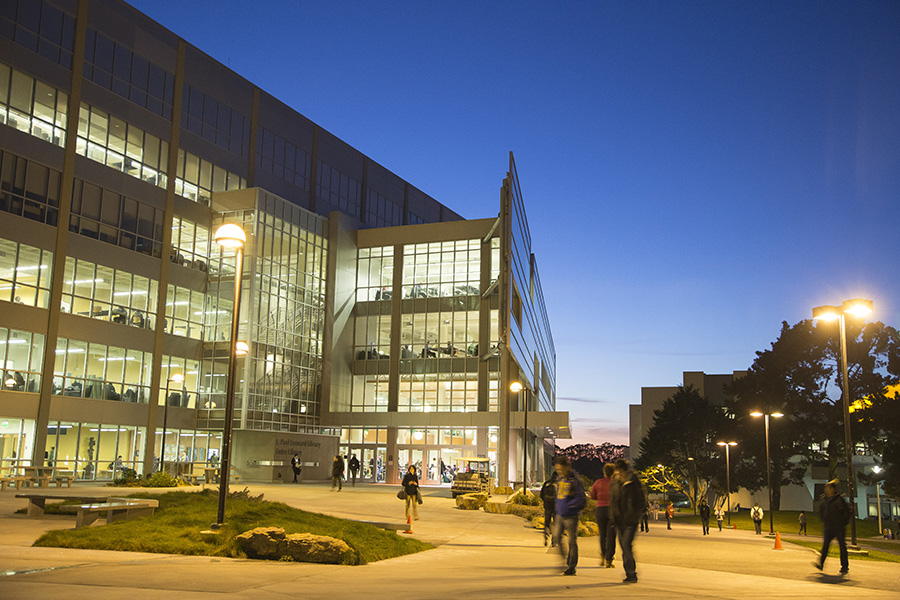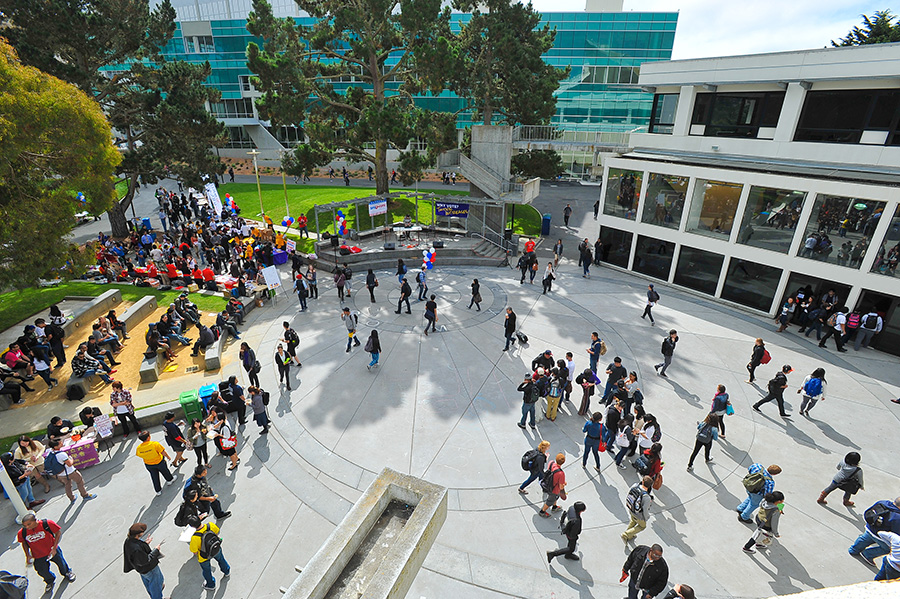College of Science & Engineering
The Department of Physics & Astronomy offers 5 undergraduate degree options: The B.A. Physics, the B.A. Physics with Concentration in Astronomy, and the B.S. Physics with Concentration in Teaching Physics degrees all provide excellent preparation for students interested in pursuing careers in K12 teaching, outreach in museums, planetaria, and science centers such as the Cal Academy of Sciences or the Exploratorium, science reporting and journalism, or for general business & industry in which a technical background and problem-solving skills are valued. These degrees are flexible enough for students to simultaneously pursue minors or B.A. degrees in other disciplines. The B.S. Physics and the B.S. Physics with Concentration in Astrophysics degrees provide broad and deep rigorous theoretical and experimental training that is ideal for students who want to pursue scientific and technical careers or advanced degrees such as the M.S. or Ph.D.
Access the list of the major requirements to better understand the structure of the major.
The roadmap puts all of your graduation requirements into an easy to follow semester by semester plan so you know what to take to stay on track. Whether you are a freshman or a transfer student, you'll be able to find a roadmap that best fits you.
Besides your major requirements, students must complete their GE and University requirements. Be sure to make sure you've completed all of these requirements for graduation.
To learn more about this major, check out the major department’s website below. You can also find out how you can access their faculty advisors who can assist you not just with course choices, but also answer questions about the field and discuss your career plans.
Department of Physics and Astronomy
Thornton Building, Room 334
Phone: (415) 338-1659
Email: physics@sfsu.edu
Website: http://www.physics.sfsu.edu/
Chair: Joseph Barranco
Freshmen Student Advising Information
After choosing “Basic Subjects” GE courses in Steps 1-3 of your Orientation process (if you haven’t done so, log onto your Orientation Profile page to follow the “Pre-Orientation Advising Module”), STEP 4 Choosing Major Classes will show you if there are any classes you can take to satisfy major requirements for your first and/or second semester.
Once you have determined your Roadmap above, review the first section below and write down any course recommendations based on your corresponding major roadmap on your Freshmen Class Planner worksheet.
First Semester Course Recommendations
|
Major Class & Title |
Units |
Other Requirement Area(s) Met |
|
Class selected from Step 1 of your Freshmen Class Planner |
3 |
Will vary depending on your class selection |
|
MATH 226 –Calculus I1,2,3,4 OR MATH 199- Pre-Calculus2,3,4 OR MATH 197 Prelude to Calculus I3 |
4
4
3 |
MATH 226 is a lower division major requirement. MATH 226 and MATH 199 are GE-Area B4 classes.
|
|
Class selected from Step 3 of your Freshmen Class Planner
|
3 |
Will vary depending on your class selection: GE Area A1 or GE Area A3
|
|
ASTR 115 – Introduction to Astronomy |
3 |
GE Area B1 |
|
If there are any course(s) listed above, please enter this information onto “Step 4” of your Freshmen Class Planner. |
Advisor Recommendations:
-
AP Calculus AB or AB subscore of 4 or 5 (but not 3) satisfies Math 226 requirement (4 units)
-
Prerequisite for MATH 226 is high school pre-calculus with “B” or better, or high school calculus with a grade of “C” or better; or a college-level pre-calculus course with a “C” or better
-
Take the First-Year Math Advising Exercise before choosing this course
-
1-unit Supplemental Instruction courses (SCI) are offered for these classes as additional support. These courses can be found in the SFSU Class Schedule (https://webapps.sfsu.edu/public/classservices/classsearch) by searching for the SCI prefix.
Once you have made your course choices for Steps 1-4, you may already have between 12-15 units chosen for your first semester—about 4 to 5 classes.
If more units are needed, you will proceed to "Step 5 - Choosing GE Courses" from your Orientation Advising Module after considering the following recommendations...
|
GE Area |
Advisor Notes |
|
A1 Oral Communication |
Covered in “Step 3” on Class Planner |
|
A2 Written English Communication |
Covered in “Step 1” on Class Planner |
|
A3 Critical Thinking |
Covered in “Step 3” on Class Planner |
|
B1 Physical Science |
There are major courses for this area |
|
B2 Life Science |
Choose Any |
|
B3 Laboratory Science |
There are major courses for this area |
|
B4 Quantitative Reasoning |
Covered in “Step 2” on Class Planner |
|
C1 Arts |
Choose Any |
|
C2 Humanities |
Choose Any |
|
D Social Sciences |
Choose Any |
|
D US History |
Choose Any |
|
E Lifelong Learning & Self-Development (LLD) |
Covered in “Step 1” on Class Planner |
|
F Ethnic Studies |
Choose Any |
|
US/CA Government |
Choose any |
All Physics & Astronomy majors need to complete coursework in linear algebra and differential equations. Students may take a combined course that covers both these topics with less depth (MATH 245 - Elementary Differential Equations and Linear Algebra), or students who want more depth (especially students who want to complete a Minor in Mathematics) should take two separate courses in linear algebra (MATH 325) and ordinary differential equations (MATH 376).
(1) A.P. Calculus AB with a score of 4 or 5 is equivalent to MATH 226 - Calculus I
(2) A.P. Calculus BC with a score of 4 or 5 on the AB subpart is equivalent to MATH 226 - Calculus I
(3) A.P. Calculus BC with a score of 5 is equiavlent to both MATH 226 - Calculus I and MATH 227 - Calculus II
(4) A.P. Physics CM with a score of 4 or 5 is equivalent to PHYS 220/222 - General Physics with Calculus I and Lab
(5) A.P. Physics CEM with a score of 4 or 5 is equivalent to PHYS 230/232 - General Physics with Calculus II and Lab
(6) A.P. Computer Science A with a score of 4 or 5 satisfies the computer science requirement for the B.S. degrees
The B.A. Physics, the B.A. Physics with Concentration in Astronomy, and the B.S. Physics with Concentration in Teaching Physics degrees all provide excellent preparation for students interested in pursuing careers in K12 teaching, outreach in museums, planetaria, and science centers such as the Cal Academy of Sciences or the Exploratorium, science reporting and journalism, or for general business & industry in which a technical background and problem-solving skills are valued.
Transfer Student Advising Information
Please see the box above labeled “Major Curriculum/Roadmaps & GE/University Requirements” for information on what courses to take in your first semester at SF State. View our Frequently Asked Questions for Transfers for helpful tips and additional information.




